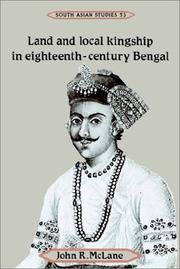| Listing 1 - 5 of 5 |
Sort by
|

ISBN: 0511563345 0521410746 052152654X Year: 1992 Volume: 53 Publisher: Cambridge : Cambridge University Press,
Abstract | Keywords | Export | Availability | Bookmark
 Loading...
Loading...Choose an application
- Reference Manager
- EndNote
- RefWorks (Direct export to RefWorks)
This book examines the politics and culture of landholding in eastern India. Professor McLane explores the dual and sometimes conflicting roles of the zamindars, the landed chiefs, in eighteenth-century western Bengal during the decline of the Mughal empire and the rise of the British hegemony. He focuses on zamindari rent extraction, techniques of coercion, and the meaning of gift-giving and gift-receiving. He shows how the zamindars kept alive the rituals, patronage, and other traditions of normative Hindu kingship for their subjects in the villages while they extracted revenue from the peasantry and intermediate gentry for the government of the Mughals and then the English East India Company. He argues that the increased commercialization and efforts to maximize land revenues imposed severe strains on the paternalistic and gift-oriented culture of Bengal's huge landlords. This analysis is illustrated with a case study of Bengal's most important and controversial zamindari, the Burdwan raj.
Land tenure --- Agrarian tenure --- Feudal tenure --- Freehold --- Land ownership --- Land question --- Landownership --- Tenure of land --- Land use, Rural --- Real property --- Land, Nationalization of --- Landowners --- Serfdom --- History --- India --- Kings and rulers. --- Arts and Humanities
Book
Year: 1977 Publisher: Princeton (N.J.) : Princeton university press,
Abstract | Keywords | Export | Availability | Bookmark
 Loading...
Loading...Choose an application
- Reference Manager
- EndNote
- RefWorks (Direct export to RefWorks)
Book
ISBN: 9781400870233 Year: 2015 Publisher: Princeton, NJ
Abstract | Keywords | Export | Availability | Bookmark
 Loading...
Loading...Choose an application
- Reference Manager
- EndNote
- RefWorks (Direct export to RefWorks)

ISBN: 9780511563348 9780521410748 9780521526548 Year: 1992 Publisher: Cambridge Cambridge University Press
Abstract | Keywords | Export | Availability | Bookmark
 Loading...
Loading...Choose an application
- Reference Manager
- EndNote
- RefWorks (Direct export to RefWorks)
Book

ISBN: 9780824891336 Year: 2023 Publisher: Honolulu
Abstract | Keywords | Export | Availability | Bookmark
 Loading...
Loading...Choose an application
- Reference Manager
- EndNote
- RefWorks (Direct export to RefWorks)
| Listing 1 - 5 of 5 |
Sort by
|

 Search
Search Feedback
Feedback About UniCat
About UniCat  Help
Help News
News